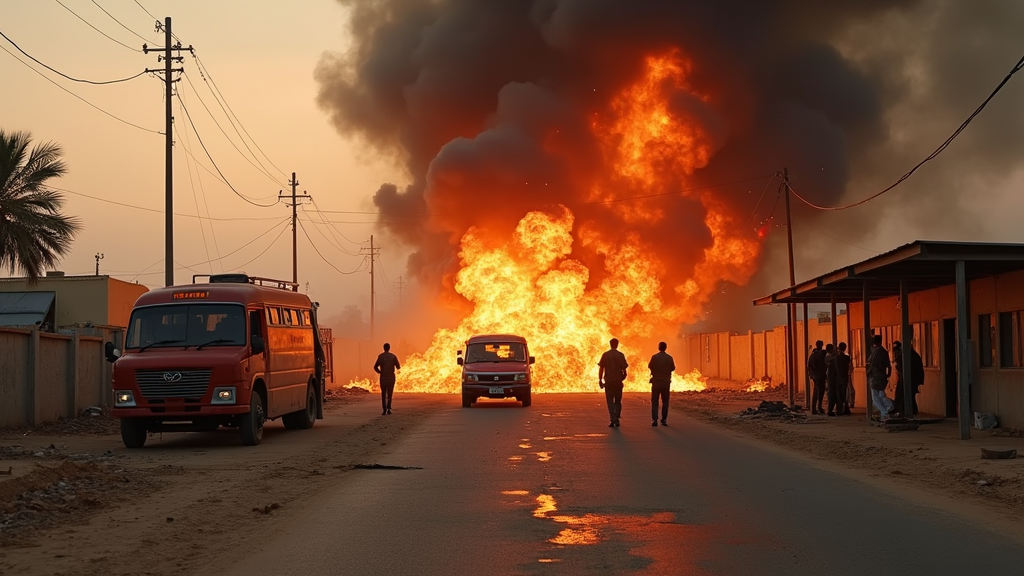The recent bomb explosion in Borno has left a community in mourning, with nine feared dead following a devastating attack at a local bus stop in Mairari village, Guzamala Local Government Area. This tragic incident, caused by an improvised explosive device (IED), occurred around 11 a.m. on Saturday as individuals were gathering to board vehicles. Such attacks, linked to Boko Haram’s ongoing insurgency, highlight the fragile security situation in Borno State. The explosion not only resulting in fatalities but also injuries to numerous others, prompting urgent calls for improved safety measures. As the region continues to grapple with frequent bombings and violence, the need for efficient Borno State security forces becomes increasingly evident.
In the heart of Nigeria’s Borno State, recent violent events have raised alarming concerns regarding community safety and security. The catastrophic IED explosion at a bus stop in Mairari sends a grim reminder of the persistent threat posed by extremist groups like Boko Haram and ISWAP. Reports indicate that nine individuals lost their lives in this heart-wrenching attack, which underscores the vulnerability of civilians in regions plagued by insurgency. Residents who once found solace in returning to their homes for farming now face the dire reality of violence lurking at their doorstep. It is vital for state authorities to enhance their protective measures and restore a semblance of peace in Guzamala and surrounding areas.
Understanding the Impact of Borno Bomb Explosions
The recent bomb explosion at a local bus stop in Mairari village, which left nine feared dead, underscores the devastating impact of insurgency in Borno State. IEDs, or improvised explosive devices, have increasingly become a weapon of choice for Boko Haram and ISWAP militants. These explosions not only claim lives but also instill a deep sense of fear and insecurity within communities. As people attempt to go about their daily routines, the threat of such attacks looms large, disrupting the fragile peace in the region.
Furthermore, the persistent threat of bomb explosions and other forms of violence has significant socio-economic consequences. Communities that are regularly attacked face considerable challenges in terms of resettlement, agriculture, and livelihood. Many areas within Guzamala Local Government have seen a decline in population as residents flee the violence, resulting in disruption of local economies that rely on farming and trade. With renewed Boko Haram activities, it’s essential for state and federal authorities to implement better security measures to safeguard the lives of innocent civilians.
Boko Haram’s Continued Assaults: A Call for Security Reinforcement
Boko Haram’s relentless attacks continue to highlight the urgent need for enhanced security in Borno State. The recent bombing at the Mairari bus stop, attributed to IEDs planted by terrorists, showcases how vulnerable civilians have become in their own communities. As confirmed by the Speaker of the Borno State House of Assembly, the tragedy not only claimed lives but also reflects the larger issue of inadequate security presence in recycled areas that are periodically nurtured back to life, only to be subjected again to violence.
As communities like Mairari strive for normalcy, the call for more robust security measures grows louder. The authorities must bolster their efforts through intelligence gathering and increased military presence, particularly in areas previously under the control of Boko Haram. Support from local vigilante groups and the Civilian Joint Task Force (CJTF) can also prove invaluable in monitoring and safeguarding these regions. However, until a sustainable solution is found, citizens remain at risk of IED explosions and other insurgent attacks.
The Human Cost of Terrorism: Lives Shattered by IED Explosions
Each bomb explosion in Borno State leaves a trail of destruction that goes far beyond the physical damage. The tragedy at Mairari has taken nine lives, causing immeasurable grief to families and communities. Survivors not only face physical injuries from IED blasts but also carry emotional scars that can last a lifetime. The implications of such violence are profound, affecting community cohesion and trust in authorities tasked with ensuring their safety.
Moreover, the psychological toll of living under the threat of Boko Haram attacks cannot be underestimated. It leads to a culture of fear, where daily activities like traveling to a bus stop become laden with anxiety. Anxiety and depression rates among those directly affected soar, prompting calls for urgent psychological support and trauma healing programs. Rebuilding the shattered lives of victims and families is essential for restoring hope and encouraging resilience in the face of ongoing terror.
Borno State’s Struggle for Stability amid Violence
Borno State’s battle for stability is continually challenged by the actions of insurgent groups such as Boko Haram and ISWAP. The recent eruption of violence exemplified by the bombing of a local bus stop illustrates not only the dangers local authorities face in maintaining order, but also shows the sheer unpredictability of these attacks. Guzamala Local Government, where Mairari village is located, represents a microcosm of the broader issues confronting the state: the need for peace amid relentless insurgency.
Efforts to stabilize the region must include comprehensive strategies that encompass military interventions, socio-economic development, and community engagement. The government, alongside international organizations, must prioritize rebuilding infrastructure and fostering an environment where security is perceived as achievable. Addressing the underlying grievances that fuel extremism is paramount for Borno State’s long-term recovery and security.
The Role of the Civilian Joint Task Force in Borno’s Security
The Civilian Joint Task Force (CJTF) has played a significant role in combating Boko Haram and enhancing security across Borno State. This volunteer security group has aided the Nigerian military’s counter-insurgency operations, helping to protect communities from the ongoing insurgent threats, including those posed by IEDs. In light of recent attacks, the CJTF’s involvement becomes even more critical as they work alongside official forces to monitor activities and protect vulnerable populations.
Despite challenges and the loss of their members in ambushes and bombings, the CJTF continues to be a vital force against insurgency in regions like Guzamala. Their local knowledge and determination equip them to take proactive measures against potential terrorist maneuvers, including identifying suspicious activities and alerting relevant authorities. Strengthening the capacity of the CJTF with additional training and resources will enhance their effectiveness and provide communities with a sense of security amidst uncertainty.
Community Resilience in the Face of Terror
Community resilience is vital in areas plagued by terrorist activities like those seen in Borno State. Following the recent bomb explosion, the spirit of resilience has shone through as the people rally together to support each other in times of grief and uncertainty. Mairari village, despite being targeted by insurgents, has shown determination among its remaining residents who are unwilling to be defeated by fear.
Efforts to build resilience include community-led reconciliation programs, agricultural cooperatives, and educational initiatives aimed at empowering the youth. This collective action not only promotes healing but also helps to rebuild the social fabric necessary for lasting peace. The participation of local leaders is crucial in guiding and mobilizing these community efforts, demonstrating that even in the shadow of violence, hope can lead to recovery and strength.
Government Accountability and the Need for Action
The government’s responsibility to protect its citizens is more important than ever in the wake of increasing violence from insurgent groups in Borno State. The bombing at the bus stop, which resulted in significant casualties, has led to calls for accountability from political leaders and security agencies. Vigilance is paramount, and citizens expect their leaders to assure them of safety and provide timely responses to attacks.
In addressing grievances, policymakers must prioritize transparent communication with affected communities about security strategies and actions taken to combat terrorism. Collaboration with international partners could enhance operational capabilities and introduce new approaches to intelligence and surveillance, aiming to preempt further violence. Ensuring that justice is served for victims of bomb attacks will restore faith in the government’s ability to protect its citizens.
The Cycle of Violence and Opportunities for Peace
The cycle of violence in Borno State, characterized by IED explosions and armed attacks, continues to threaten the prospect of lasting peace. As communities reel from the impacts of insurgency, it’s evident that efforts to end this cycle entail a multifaceted approach. Dialogue with insurgent factions, re-integration programs for former combatants, and enhanced community policing initiatives are application areas requiring immediate focus.
Moreover, fostering a culture of peace through conflict resolution strategies must be prioritized. Local stakeholders can take a significant role in promoting dialogue among different groups within the community to address grievances and find peaceful solutions. This comprehensive pathway is crucial for breaking the cycle of violence and paving the way for rebuilding and reconciliation in a region that has endured much suffering.
The International Community’s Role in Borno’s Recovery
The international community holds a vital role in supporting recovery efforts in Borno State following continuous assaults from Boko Haram and ISWAP. Humanitarian aid, security assistance, and development programs are crucial components of a coordinated response to the violence witnessed in incidents like the recent bus stop bombing. Organizations focused on conflict resolution can partner with local entities to bolster the capacity for recovery.
Furthermore, attention from global stakeholders can elevate the plight of those affected by terrorism in Nigeria, pushing for increased funding and resources directed to the region. It can also support efforts to influence policy decisions that favor human rights and community development. By working together, both international organizations and local governments can strengthen the response to the crisis and facilitate long-term recovery in Borno.
Frequently Asked Questions
What happened during the Borno bomb explosion at the bus stop in Mairari village?
The Borno bomb explosion occurred on Saturday at a local bus stop in Mairari village, Guzamala Local Government Area, where an improvised explosive device (IED) was detonated, resulting in nine fatalities and several injuries.
How many people were affected by the IED explosion in Borno?
The IED explosion in Borno led to reports of nine people feared dead and many others injured, highlighting the ongoing security challenges in the region.
What are the implications of Boko Haram attacks on Borno State security?
Boko Haram attacks significantly impact Borno State security, as demonstrated by the recent bus stop attack where IEDs were used, revealing the ongoing threat to safety and stability in areas such as Guzamala.
What has the response been from Borno State officials regarding the bus stop attack?
Borno State officials, including the Speaker of the Borno State House of Assembly, have condemned the bus stop attack and urged military and security agencies to enhance efforts to secure Guzamala and surrounding regions against Boko Haram activities.
Where did the recent Borno bus stop attack take place?
The recent Borno bus stop attack took place in Mairari village, which is part of Guzamala Local Government Area, known for its vulnerability to bomb explosions and attacks from terrorist groups.
What measures are being taken to improve security in Guzamala Local Government, Borno State?
Authorities are calling for increased military presence and enhanced security measures in Guzamala Local Government, especially in areas previously affected by Boko Haram attacks, to protect vulnerable communities from further incidents.
How do the bomb explosions in Borno relate to the activities of Boko Haram?
The bomb explosions in Borno, particularly the recent IED attack, are directly linked to the activities of Boko Haram, which has been known to target civilians and disrupt peace in the region.
What should residents of Borno know about safety in light of recent IED explosions?
Residents of Borno should remain vigilant and report suspicious activities, stay away from known conflict areas, and follow safety advisories from local authorities to mitigate risks associated with IED explosions and Boko Haram attacks.
How can the local government in Borno State address the terrorist threats more effectively?
The local government in Borno State can address terrorist threats more effectively by collaborating with security agencies, improving intelligence sharing, increasing community engagement, and providing support for resettled populations in areas like Guzamala.
What has been the reaction of the community to the bomb explosion at the Borno bus stop?
The community’s reaction to the bomb explosion at the Borno bus stop has been one of grief and outrage, as many residents mourn the loss of life and express concerns over the persistent threat posed by Boko Haram in their lives.
| Date and Time | Location | Casualties | Cause of Explosion | Official Statement | Background | Response from Authorities |
|---|---|---|---|---|---|---|
| Saturday, 11 a.m. | Mairari Village, Guzamala LGA | 9 dead, several injured | Improvised explosive device (IED) | Confirmed by Rt. Hon. Abdulkarim Lawan, Speaker of Borno State House | Mairari village has been resettled twice but faces renewed attacks from Boko Haram and ISWAP | Call for military action to restore security in Guzamala area by local officials |
Summary
The recent Borno bomb explosion has left nine people dead and several others injured, highlighting the persistent violence in the region due to Boko Haram and ISWAP activities. The tragic incident occurred at a local bus stop in Mairari village, where an improvised explosive device (IED) was planted by terrorists. Local authorities, including the Speaker of the Borno State House, have called for increased security measures in Guzamala as residents who had returned to farm are again facing threats to their safety. This incident serves as a grim reminder of the ongoing insurgency in northeastern Nigeria and the urgent need for effective measures to protect vulnerable communities.



